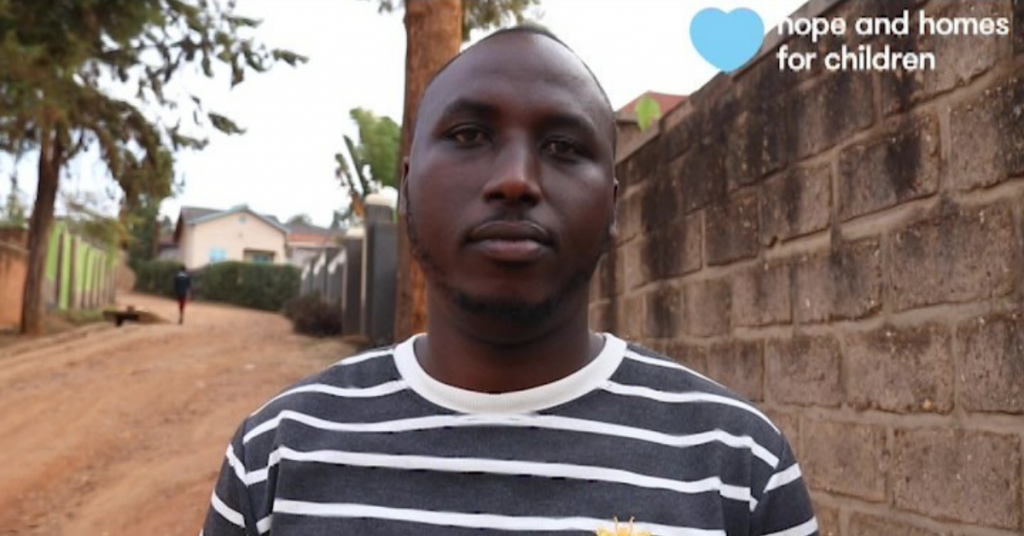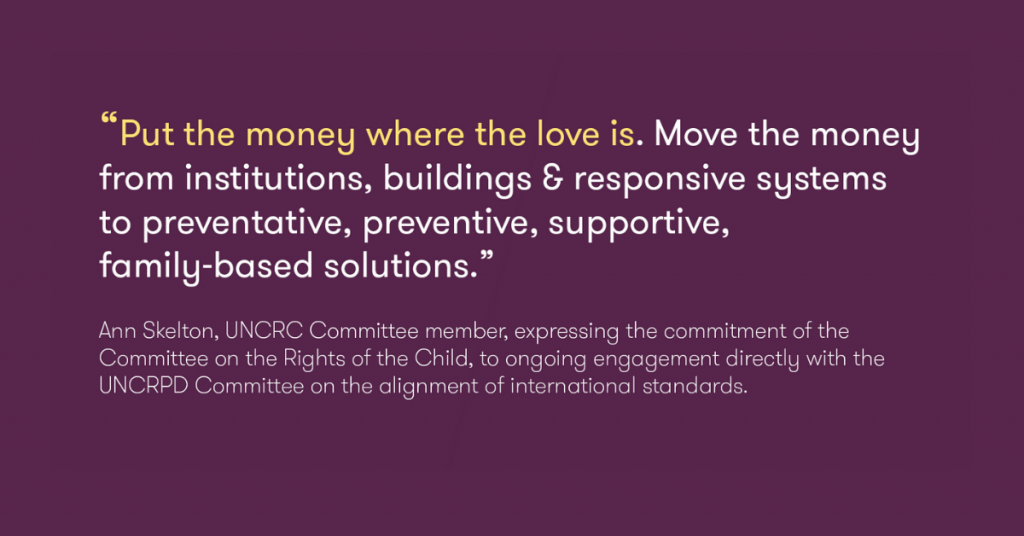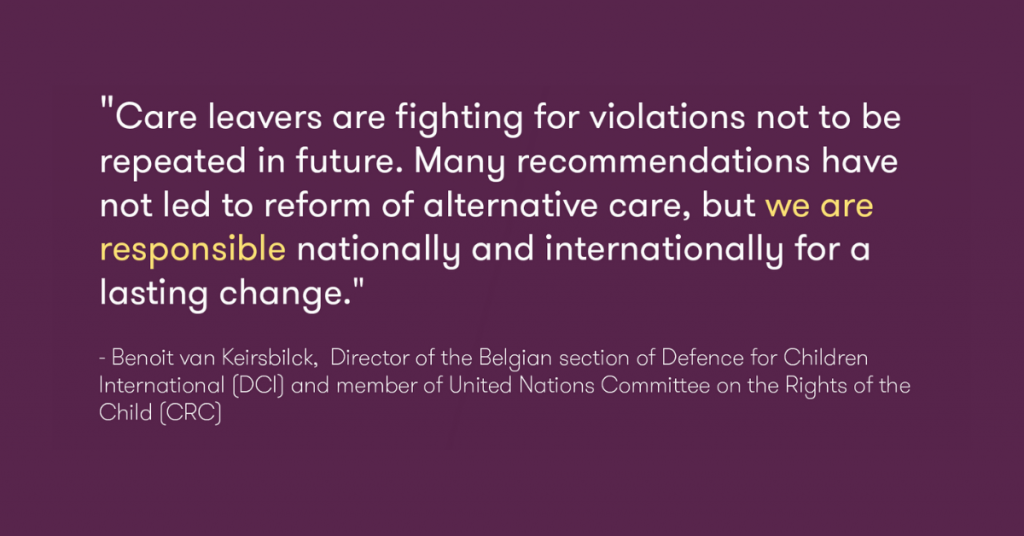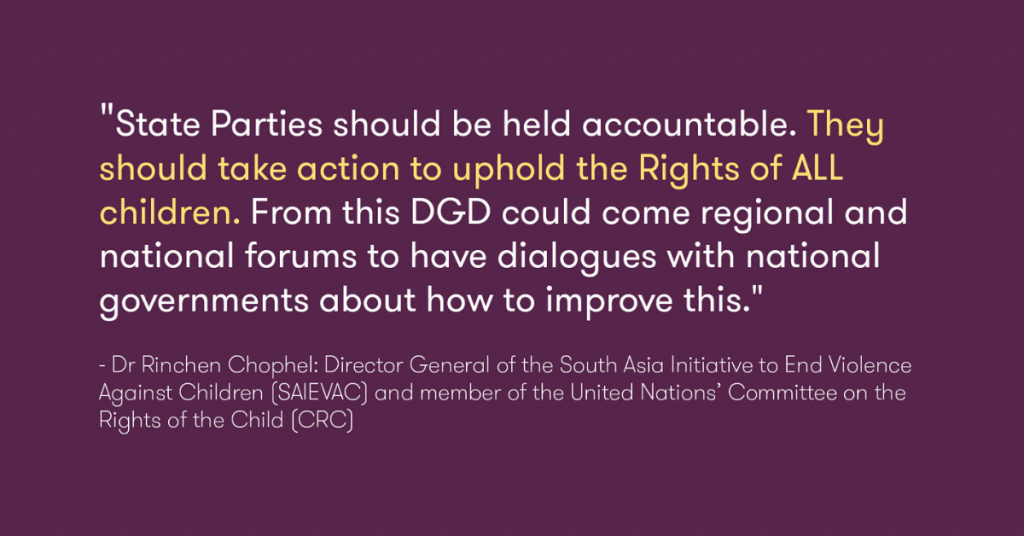The opportunity to discuss alternative care on child protection system reform, at a global level, is rare. In 2019, the UN General Assembly in New York adopted a Resolution on the Rights of the Child that signified a major milestone in ending the institutional care of children globally. However, the last dedicated UN Convention on the Rights of the Child Day of General Discussion (DGD) on children’s rights and alternative care was in 2005.

That is why the UN Committee on the Rights of the Child (CRC)’s DGD which took place this September was so important. Hope and Homes for Children are proud of the central role we took in the preparations for this important event. We worked collaboratively with other CSOs to heavily influence how it was organised, by:
- Influencing the contents preparations (concept note, guidelines for consultations, etc.)
- Contributing to shaping the programme and supporting speakers (e.g. our Country Director for South Africa, Lourenza Foghill, and a young person with disabilities from our Rwanda programme, Aime de Jesus).
- Co-leading the workstream on child and youth participation
- Supporting the organization of regional DGD Hubs (Particularly the one for East and Southern Africa)

UN Convention on the Rights of the Child DGD on Children’s Rights and Alternative Care 2021
The 2021 DGD took place on 16/17 September 2021. All in all, it was a very successful event. The choice of a remote conference, despite the technical headaches, proved a winning strategy. It democratised the event and allowed for genuine participation from different world regions. The voices of children and young people were front and centre of the DGD, in a very genuine and non-tokenistic way – delivering powerful messages and testimonies directly to the UN Committee on the Rights of the Child. Preventing children from going into institutional care was one of the most important issues raised by the young people. Along with feeling loved, respected, safe and protected from abuse and violence.
Outcomes
We are delighted to have been involved in supporting children and young people in co-creating the Day of General Discussion, its working groups and individual sessions.
- More than 500 children, young people, governments, academics and experts gathered for the Day of General Discussion, including more than 200 submissions, and a global survey of children and young people with care experience, with more than 1100 responses from 50 countries. The Day of General Discussion had at least the same number of care experienced children as adults speak throughout the event – this is a unique achievement.
- Aimé de Jesus, a care leaver from Rwanda, supported by Hope and Homes for Children gave an excellent presentation, reflecting the reality that children with disabilities with the right kind of support can and should be included in deinstitutionalisation programmes. Lourenza Foghill, our regional director for South Africa, presented an expert view of the importance of prevention and building resilient communities, sharing Hope and Homes for Children’s experience in South Africa.
- Hope and Homes for Children was pleased to see that the messages of our submissions to the DGD were taken on board by members of the Committee on the Rights of the Child. These included calls for better coherence within the UN human rights system and for regional conversations among governments to follow up from the DGD.
- Hope and Homes for Children championed regional consultations in the run up to the DGD, these were most effective at projecting new voices and viewpoints into this debate.

What’s next?
We will work with other NGOs to call for members of the UN Committee on the Rights of the Child and the UN Committee on the Rights of Persons with Disabilities to engage in dialogue about alternative care and come up with joint language and guidance for States related to alternative care, care reform and institutionalisation of children.
The DGD should be understood as a process, rather than a single event. Over the last year and a half, we have strengthened collaboration with civil society, kept up global momentum for care reform and invested in the meaningful participation of children and young people with care experience from all over the world. This process doesn’t end now – we will continue engaging with the UN human rights treaty bodies (particularly the Committee on the Rights of the Child and the Committee on the Rights of Persons with Disabilities) to ensure our messages are delivered to UN member states through the UN treaty bodies reporting system. We will also channel the positive energy created by the DGD into more permanent frameworks for joint advocacy actions, such as the Collaborative Platform.

Links: